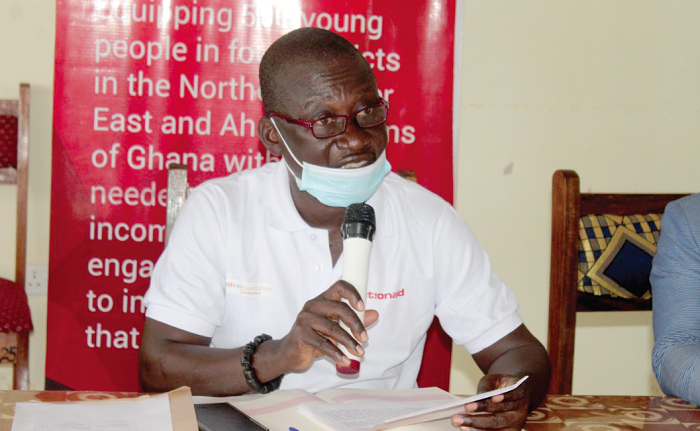
Ahafo RCC to train 3,000 youth in employable skills
The Ahafo Regional Coordinating Council (RCC) has put in place a programme to train and present start-up tools and equipment to more than 3,000 young people as part of efforts to provide decent jobs and reduce unemployment in the newly created region.
The livelihood empowerment programme, which is expected to start this month, will focus on different business modules such as auto-mechanic, carpentry, hair dressing, dress-making, pastries making, plumbing, tiling, welding and barbering, among others.
The Chief Coordinating Director of the RCC, Mr Ebenezer Amoah, disclosed this to the Daily Graphic on the sidelines of the Ahafo youth stakeholders’ forum, organised by ActionAid Ghana in Goaso in the Ahafo Region last Wednesday.
Forum
The forum brought together institutions and organisations such as the Ghana Enterprise Agency, National Youth Authority, Ghana Education Service, traditional authorities, National Commission for Civic Education and the Department of Social Welfare, among others.
At the end of the forum, participants came out with a communique to be presented to the regional minister on the key issues that needed to be addressed.
The participants, among others, expressed concern about the high rate of youth unemployment, bad roads, teenage pregnancies and substance abuse affecting the development of the region and the youth in the area.
Mr Amoah explained that the training and the presentation of start-ups would help to give them decent jobs, improve their living standards and boost the socio-economic development of the area.
He said the council had secured some of the tools, with the hope of securing the rest before the end of this month.
Mr Amoah explained that the RCC was ready to adopt any business module that would be proposed by a trainee which was not part of the council's modules.
High unemployment
The Bono and Ahafo Regional Programme Officer of Actionaid Ghana, Mr Kwame Afram Denkyira, said high unemployment among the youth had become a major concern in recent times, explaining that the phenomenon was not peculiar to only developing countries, but had become a global challenge.
He said while the youth in Ghana had the potential to be a major asset to the economy, most young people either dropped out of school or completed school but were unable to find employment.
“Each year, while about 300,000 young people enter the labour market, only two per cent, which is less than 6,000 of them, find formal employment,” Mr Denkyira stated, explaining that young people either survived in the informal sector or remained unemployed.
He said it was important to address the challenge before it further worsened.
Mr Denkyira, therefore, called for special attention to be paid to the urban areas since more youth were migrating to those areas because of the impression that more opportunities existed there.
He explained that generating employment for the youth and equipping them with the requisite skills and resources to explore opportunities, was critical to bringing about a reduction in poverty levels.
Mr Denkyira explained that factors such as the lack of education and skills development opportunities, exclusion from community decision-making processes, lack of access to resources and credit, hindered the ability of the youth to earn enough money to lift themselves out of poverty.
Skills training
He said ActionAid was currently working to ensure that 500 youth aged between 18 and 35 years in four districts in the Northern, Upper East, and Ahafo regions were equipped with skills to generate more income and engage with government to influence decisions that would affect their future.
Mr Denkyira said they had developed a selection criteria for the beneficiaries, in order to ensure that they engaged with young people who would benefit most from that intervention.
He said they were implementing the project in Gambia 1, Obengkrom, Kenyasi No.3, Kojokrom and Koforidua in the Asutifi North District.
Mr Denkyira said within the last two years, in collaboration with the Yamfo Vocational Training Institute, ActionAid had trained 131 young people comprising 98 females and 33 males in five artisanal areas, namely auto mechanic, pastry making, bead making, sandal work, soap making and tiling.
For her part, the Bono Regional Director of the NYA, Mrs Fati Bamba, pledged the authority's support to the various programmes aimed at providing employment to the youth.
